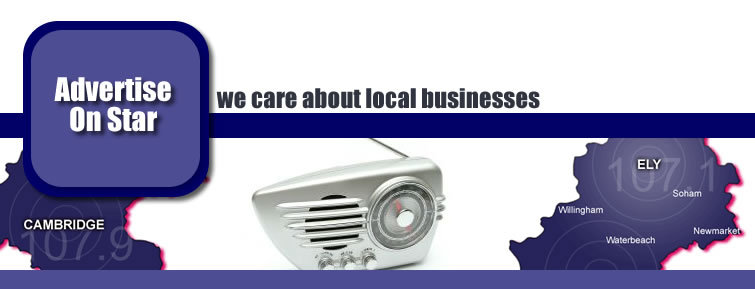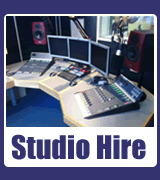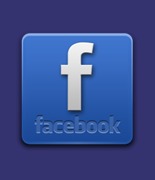
Star Radio is THE Local choice for Cambridge and Ely
It is a trusted source of local news, weather and traffic & travel therefore adds credibility to your message.
Not only will you be buying into a great product but also a great service, with your own personal account manager and a visit by a creative writer in your place of work.
Why Radio?
1. Radio offers efficient targeting
Radio targets audiences efficiently because different stations attract different listeners - Kerrang listeners are worlds apart from Classic FM listeners etc.
This allows advertisers to talk selectively to the groups they are most interested in. Added to this is radio's regional/local structure, which means that brands can focus their activity very effectively onto key market areas.
2. Radio reaches people at relevant times and places
Most radio listeners are engaged in another activity, and this means that advertisers can reach listeners at key "touchpoints" - when they are on the school run, surfing the internet, before going out on Friday nights, and so on.
And now that radio can be heard on mobiles, on the internet etc, these touchpoints are becoming even more widespread.
Research shows that advertising which is relevant to a listener's other activity is over 60% more likely to be recalled.
3. Radio reaches out in an ad avoidance world
Research shows that radio, together with cinema, has the lowest level of advertising avoidance - people rarely switch stations, and are available to listen to any message that is relevant, creative, intriguing etc. This is a great opportunity for advertising who want to reach out to new customers, or to tell existing customers something they didn't know.
4. Radio has a "multiplier effect" on other media
Radio's way of multiplying the effect of other media is a feature of multi-media research studies. The original Millward Brown Awareness Multiplier Study showed how radio multiplies the effect of TV, and since then the finding has been re-echoed in the joint OAA/RAB study into radio & outdoor, and also the US RAEL study into radio vs print.
Radio's multiplier effect seems to originate in the fact that it is an audio-only medium, and therefore stimulates a different part of the brain.
5. Radio creates a large "share of mind" for a brand
In the same that radio stations create chart music success, they create a sense of ubiquity for a brand. This is for two main reasons - firstly, because radio ads are on frequently, and secondly because listeners tend to spend so long listening (on average 14 hours per week).
A brand which is big in radio can create a disproportionately large share of mind for itself.
6. Radio drives response, especially online
Radio has always been a strong "call-to-action" medium, and this is even more true in a world where consumers access brands via the internet. Recent IAB/RAB joint research revealed that at any given time a fifth of internet surfers are listening to radio - so they are a click away from interacting with a brand.
7. Radio is "a friend"
Listeners use radio for emotional reasons - to keep their spirits up, to stop themselves from feeling bored in a car or isolated while doing daily chores. This leads to them seeing radio as a kind of friend, and this is a valuable context for an advertiser to appear in.
It is even more powerful when advertising extends through into branded content - sponsorships & promotions. When a radio station presenter talks about "our friends at Company X", the listener is hearing about a friend of a friend - this has a strong effect on bringing a brand closer.
source: RAB.co.uk
Why use Radio for Recruitment?
High reach of your audience:
69% of UK adults 18-60 in employment listen to Commercial Radio for an average of 12.4 hours each week.
Cost-efficient advertising:
Over 300 UK radio stations provide recruitment advertisers with more choice and defined targetingresulting in less wastage.
Intrusive:
Radio can be consumed alongside other media and other day-to-day activities. You can't read a newspaper or watch TV whilst you are driving a car, but radio is the soundtrack to people's lives meaning you can communicate with potential applicants when they are most receptive to your recruitment message. 5 million adults listen to radio whilst they are at work - a key time to reach job-seekers with yourrecruitment message.
Radio is a trusted source of information:
Listeners use radio for emotional reasons and it becomes a friend and companion. Stations interact personally with each listener, encourage debate and are thought provoking. Radio also plays music people want to hear and involves them across a variety of platforms including on air, online and at station events.
Morale booster:
Radio promotes the company's image as an employer - this helps not only in terms of recruitment, but as a retention aid for current staff. Hearing their company on the radio builds a sense of pride.
Creativity:
Radio offers a greater degree of creativity; including the use of innovative concepts, creative sound effects, voice-casting and scripting.
Measureable:
The bottom-line in recruitment is always tangible response on your investment. As a recruiter you want to see how any quality applicants your campaign has driven in order to measure its effectiveness.
Low ad avoidance:
It's possible to read a whole magazine without actually reading an ad, or read your local newspaper and, if you're not looking for a job, you're unlikely to read the classified section. Radio is a low ad avoidance medium, meaning more potential applicants will hear a compelling recruitment message, helping you to reach passive jobseekers.
For further information contact our sales team on 01223 305 107 and click here for the RAB Radio and Recruitment information pack.
*** Audio Testimonials Coming Soon ***
Who to Contact
We are proud to be part of UKRD Group, which owns and operates 16 stations across the UK. This provides Star Radio with the strength and experience of a group, but the local focus and involvement of a locally based station.
For further information and to request a media pack, please call our local sales team on 01223 305 107









 : Follow us on Twitter |
: Follow us on Twitter |  :
:  : View our YouTube channel
: View our YouTube channel

